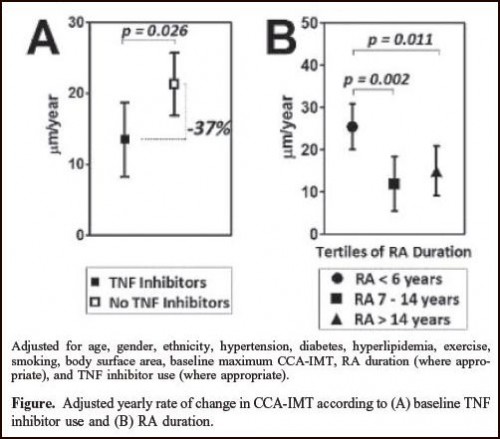New Studies Examine Predictors of Rheumatoid (Arthritis) Heart Disease
Predictors of Heart Disease in Rheumatoid Arthritis
 New Studies presented at ACR 2010 (the American College of Rheumatology’s annual meeting) examined of the heart disease of Rheumatoid Arthritis. One study called Longitudinal Predictors of Progression of Subclinical Carotid Atherosclerosis in Rheumatoid Arthritis looked for factors which predict heart disease in RA patients. “Coronary and extra-coronary atherosclerosis are increased in rheumatoid arthritis (RA) relative to controls; however, few longitudinal studies have explored predictors of change in atherosclerosis in RA patients.”
New Studies presented at ACR 2010 (the American College of Rheumatology’s annual meeting) examined of the heart disease of Rheumatoid Arthritis. One study called Longitudinal Predictors of Progression of Subclinical Carotid Atherosclerosis in Rheumatoid Arthritis looked for factors which predict heart disease in RA patients. “Coronary and extra-coronary atherosclerosis are increased in rheumatoid arthritis (RA) relative to controls; however, few longitudinal studies have explored predictors of change in atherosclerosis in RA patients.”
They monitored plaque or progression of plaque stenosis (narrowing due to plaque) especially in the internal carotid artery, which is harder to see, but more important than other arteries. Their data showed “evidence for systemic inflammation and RA disease activity as a contributor to progression of atherosclerosis in RA patients.”
Key findings of the study:
- The researchers found that baseline TNF inhibitor use was associated with a lower rate of progression.
- Higher average swollen joint count was associated with higher incidence of progressive plaque.
- Higher average CRP was also associated with higher plaque incidence. (CRP is commonly used as a heart disease screening.)
- Cumulative prednisone exposure was associated with plaque progression.
- Patients who were prescribed statins at baseline had a significantly lower rate of progression.
Can ultrasound predict heart disease in Rheumatoid Arthritis?
Another study (At What Age Is Carotid Ultrasound Most Effective in Predicting Cardiovascular Events and Mortality in Rheumatoid Arthritis?) examined patients with Rheumatoid Arthritis who were free of cardiovascular (CV) disease. “(They) imaged the carotid arteries for plaque and intima-media thickness (IMT) using high-resolution ultrasound and then followed patients prospectively until they developed an acute coronary syndrome (ACS), died from CV causes, or reached a censoring date. ACS were defined as unstable angina, myocardial infarction, cardiac arrest, or death due to ischemic heart disease. CV death was defined by mention of a CV cause in the death certificate.”
Interestingly, they determined that the “ability of carotid ultrasound to predict CV events in RA varies with age.” “Plaque and IMT are most strongly associated with CV outcomes in younger RA patients.”
Are there ways to avoid the heart disease of Rheumatoid Arthritis?
 How do I hope to be like an elephant? I tell my kids that one of my goals is to get very gray and wrinkled… and then one day to get hit by a bus. It would mean I outlived my RA. Rheumatoid Arthritis kills almost everyone it strikes, but it seldom gets the blame. It has a hired gun that gets more press: heart disease. That’s what is on the death certificate of the majority of people with RA. Is there anything we can do to live to age one hundred to get hit by that bus?
How do I hope to be like an elephant? I tell my kids that one of my goals is to get very gray and wrinkled… and then one day to get hit by a bus. It would mean I outlived my RA. Rheumatoid Arthritis kills almost everyone it strikes, but it seldom gets the blame. It has a hired gun that gets more press: heart disease. That’s what is on the death certificate of the majority of people with RA. Is there anything we can do to live to age one hundred to get hit by that bus?
Take aways for RA patients and their doctors:
Obviously, more study on RA heart disease is needed. There may be a few things RA patients can think about already:
- Many of us probably should undergo tests for cardiovascular disease (CVD) or coronary artery disease (CAD), even if we don’t have other so-called risks such as smoking or obesity.
- Biologics may provide some protection from the heart disease of RA
- Some of us should probably discuss statins with our doctors.
- Our doctors need to know more about the implications of these matters when writing on their prescription pads (especially when they write prednisone).
Note: If you have of your own blog (any kind), maybe you’ll want to participate in our first blog carnival this week. Read about the Rheumatoid Awareness question here. Email me the link to the post by Tuesday at 10 p.m. EST.




Very timely article for me…I have my first Appointment with a Cardiologist on Wednesday because of abnormalities discovered during a routine check up last week
Beth, I hope it goes well Tomorrow.
THANK YOU for the in depth info WP!
I’ll be sharing this with my Doc at my next appointment.
Keep fighting the good fight everyone———–lets aspire to be 100 year old elephants!
yes :rainbow:
Pingback: Tweets that mention New Studies Examine Predictors of Rheumatoid (Arthritis) Heart Disease | RA Education | Rheumatoid Arthritis Warrior -- Topsy.com
This is wonderful information to have. My mother (who also had RA) died of a heart attack, subsequent to a stroke. The only med available to her was enteric aspirin. She never got an ulcer, but she had quadruple bypass at 65, a stroke at 75, and the final cardiac arrest at 76. We shouldn’t have lost her so soon, but there was no arsenal to fight RA. My doctors follow my B/P very closely. But I wonder what else we should be doing to zero in on potential problems.
Ruthe, I hear this story all the time. People say my relative had RA, but they died of MI, etc. The doctors don’t even tell them it was the RA. I need to write more because from what I read, the heart disease of RA is not the same. We can eat well & have good lipid panels & it doesn’t help the same as it does for others. I hope others will also send me any articles they find so we can spread the word on anything that can help.
At 68, with other risk factors for cardiac disease, I don’t know that the information in these studies will help me. But I can hope they will help those who come along behind me.
I’m relieved that my daughter, at 42, has no symptoms of RA or even palindromic rheumatism. Maybe that will break the hereditary chain in our family that started with my grandmother (simply don’t know of anyone earlier than that).
In the meantime, I’ll send your posts to my FB and Twitter accounts to spread awareness (and HOPE) for those younger than I!
Kelly
I am all too familiar with the above topic. I just wanted to say happy Thanksgiving. I hope you create some memorable times with family and loved ones. Oh and eat an extra piece of pie just because.
Best wishes
Phil
Thank you, Phil. I was so glad to have all of my children with me this year.
Pay attention to the NSAIDs you use, as some can increase cardiovascular risk:
http://www.medscape.com/viewarticle/732868?src=rss
Interesting Read Kelly, thanks for posting this.
Doubtful it will do me much good, heart disease runs in both sides of my family, my Dad had his first heart attack at 68, has had a pacemaker for about 6 years now and is 80 in October, both of his brothers also have heart disease as did their father. My PCP says it appears to be genetic. My PCP is also my Parents Dr since there is so much that is genetic in my family, just not RA. I am the only one on both sides of my family to have it.